Research Project: Analyzing COVID-19 Impact on Employee Retention
VerifiedAdded on 2023/06/10
|34
|9883
|142
Report
AI Summary
This research project investigates the impact of the COVID-19 pandemic on employee retention within the hospitality industry. It employs both qualitative and quantitative research methods, utilizing primary and secondary data sources to analyze the challenges faced by the industry and the factors influencing employee retention during this period. The findings highlight the importance of employee retention in the hospitality sector and explore the challenges brought about by the pandemic, including decreased employee morale, travel restrictions, and workforce reductions. The study also delves into effective recommendations for employee retention, such as fostering a positive work culture, providing competitive compensation and benefits, and offering work-from-home options. Ultimately, the research aims to provide insights and strategies that can help hospitality organizations navigate the challenges of employee retention in the wake of the COVID-19 pandemic. Desklib provides past papers and solved assignments for students.
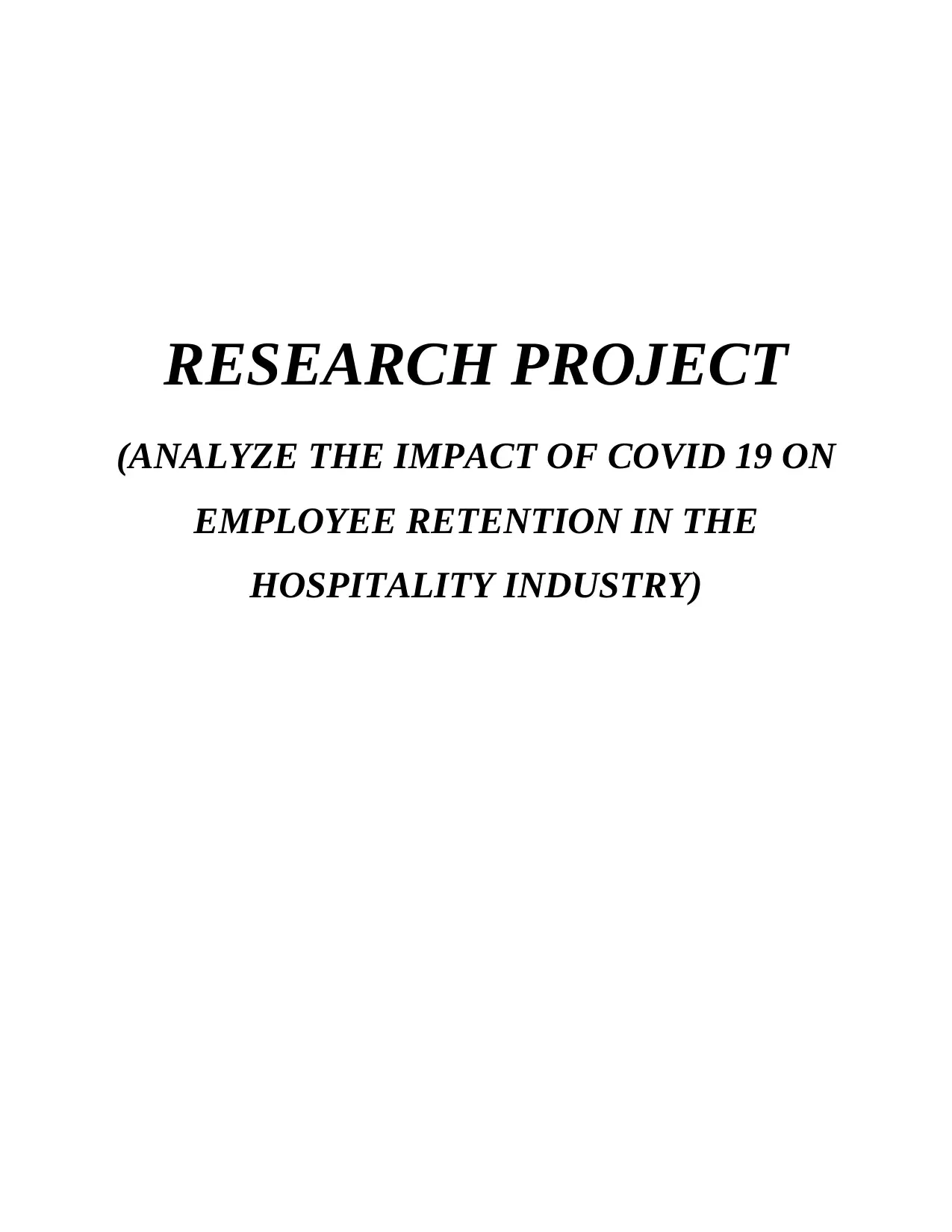
RESEARCH PROJECT
(ANALYZE THE IMPACT OF COVID 19 ON
EMPLOYEE RETENTION IN THE
HOSPITALITY INDUSTRY)
(ANALYZE THE IMPACT OF COVID 19 ON
EMPLOYEE RETENTION IN THE
HOSPITALITY INDUSTRY)
Paraphrase This Document
Need a fresh take? Get an instant paraphrase of this document with our AI Paraphraser
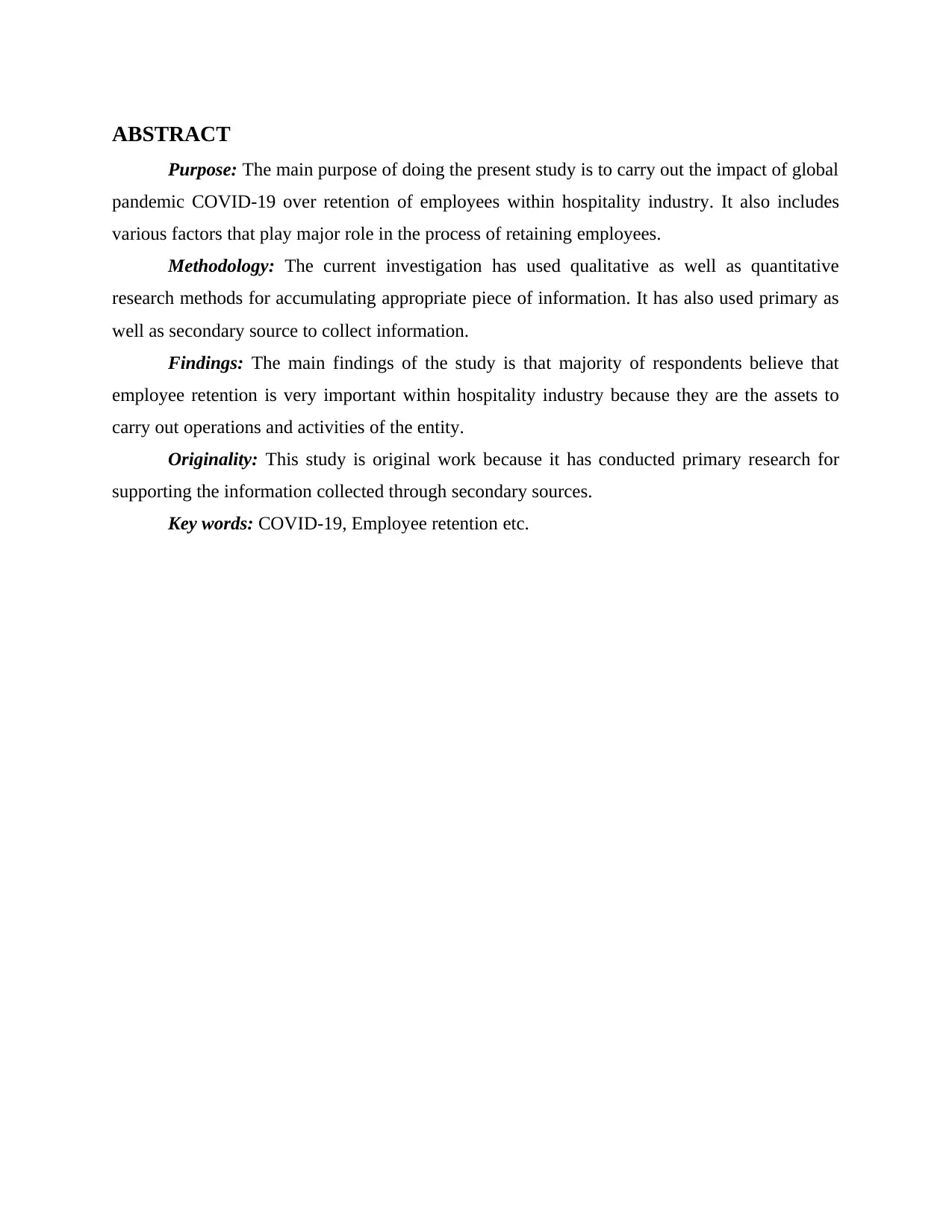
ABSTRACT
Purpose: The main purpose of doing the present study is to carry out the impact of global
pandemic COVID-19 over retention of employees within hospitality industry. It also includes
various factors that play major role in the process of retaining employees.
Methodology: The current investigation has used qualitative as well as quantitative
research methods for accumulating appropriate piece of information. It has also used primary as
well as secondary source to collect information.
Findings: The main findings of the study is that majority of respondents believe that
employee retention is very important within hospitality industry because they are the assets to
carry out operations and activities of the entity.
Originality: This study is original work because it has conducted primary research for
supporting the information collected through secondary sources.
Key words: COVID-19, Employee retention etc.
Purpose: The main purpose of doing the present study is to carry out the impact of global
pandemic COVID-19 over retention of employees within hospitality industry. It also includes
various factors that play major role in the process of retaining employees.
Methodology: The current investigation has used qualitative as well as quantitative
research methods for accumulating appropriate piece of information. It has also used primary as
well as secondary source to collect information.
Findings: The main findings of the study is that majority of respondents believe that
employee retention is very important within hospitality industry because they are the assets to
carry out operations and activities of the entity.
Originality: This study is original work because it has conducted primary research for
supporting the information collected through secondary sources.
Key words: COVID-19, Employee retention etc.
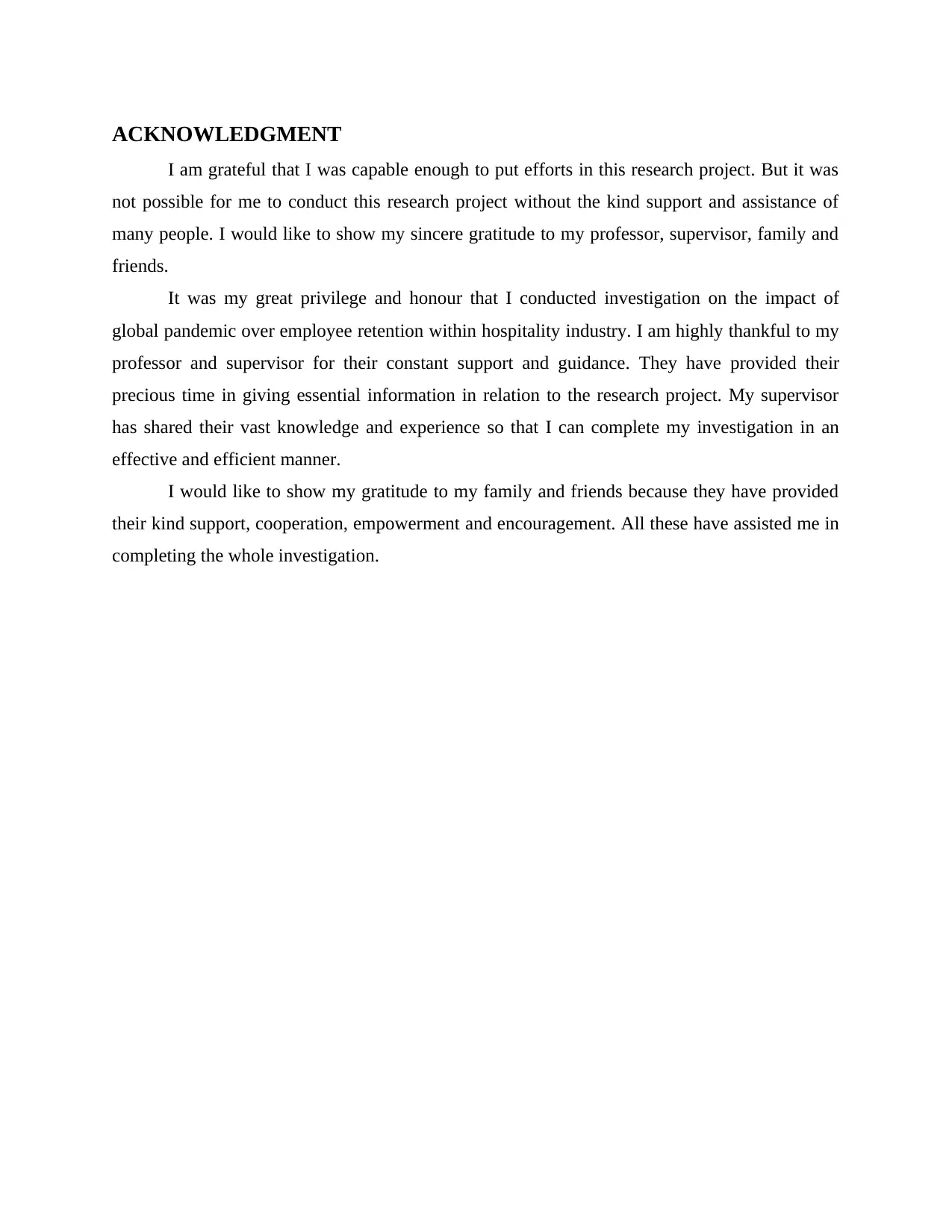
ACKNOWLEDGMENT
I am grateful that I was capable enough to put efforts in this research project. But it was
not possible for me to conduct this research project without the kind support and assistance of
many people. I would like to show my sincere gratitude to my professor, supervisor, family and
friends.
It was my great privilege and honour that I conducted investigation on the impact of
global pandemic over employee retention within hospitality industry. I am highly thankful to my
professor and supervisor for their constant support and guidance. They have provided their
precious time in giving essential information in relation to the research project. My supervisor
has shared their vast knowledge and experience so that I can complete my investigation in an
effective and efficient manner.
I would like to show my gratitude to my family and friends because they have provided
their kind support, cooperation, empowerment and encouragement. All these have assisted me in
completing the whole investigation.
I am grateful that I was capable enough to put efforts in this research project. But it was
not possible for me to conduct this research project without the kind support and assistance of
many people. I would like to show my sincere gratitude to my professor, supervisor, family and
friends.
It was my great privilege and honour that I conducted investigation on the impact of
global pandemic over employee retention within hospitality industry. I am highly thankful to my
professor and supervisor for their constant support and guidance. They have provided their
precious time in giving essential information in relation to the research project. My supervisor
has shared their vast knowledge and experience so that I can complete my investigation in an
effective and efficient manner.
I would like to show my gratitude to my family and friends because they have provided
their kind support, cooperation, empowerment and encouragement. All these have assisted me in
completing the whole investigation.
⊘ This is a preview!⊘
Do you want full access?
Subscribe today to unlock all pages.

Trusted by 1+ million students worldwide
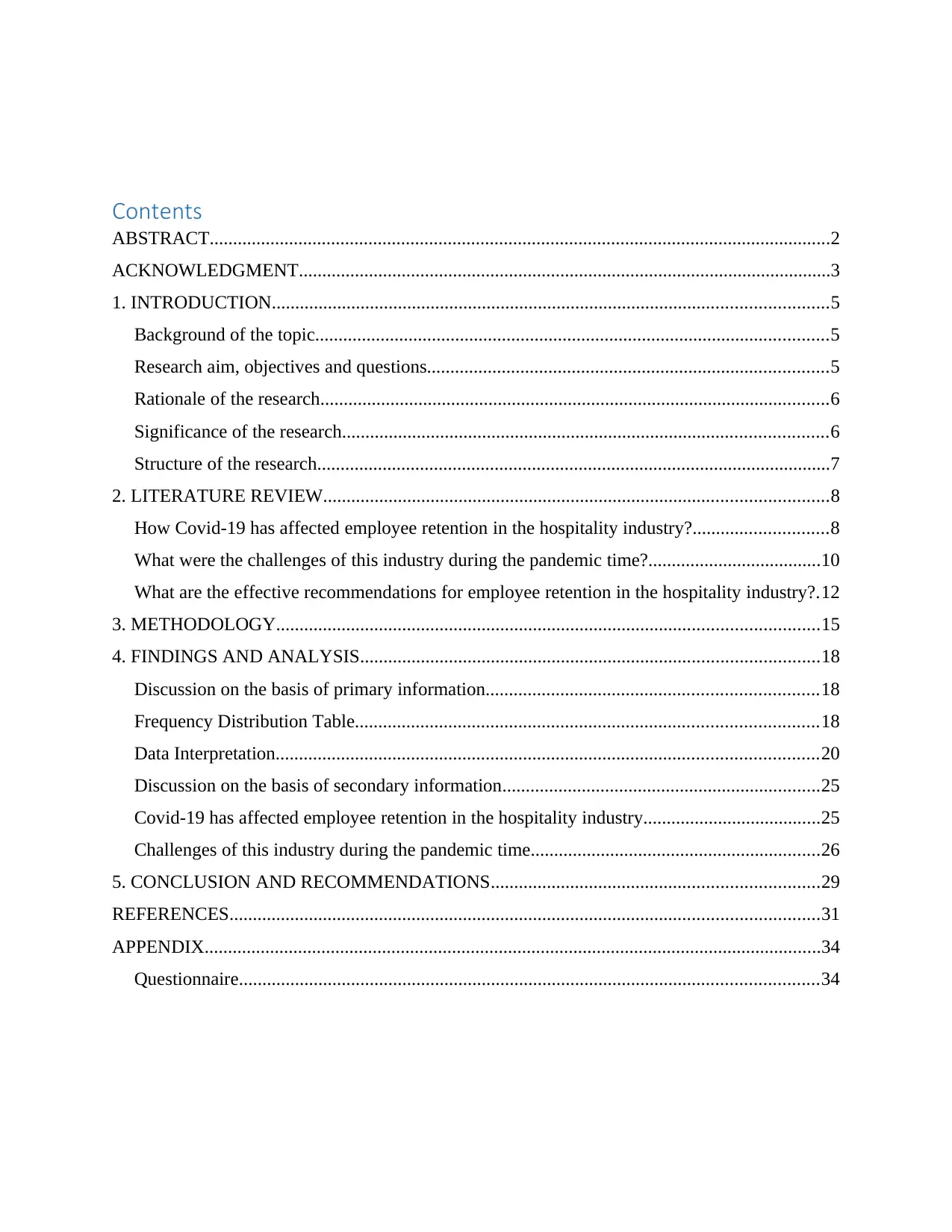
Contents
ABSTRACT.....................................................................................................................................2
ACKNOWLEDGMENT..................................................................................................................3
1. INTRODUCTION.......................................................................................................................5
Background of the topic..............................................................................................................5
Research aim, objectives and questions......................................................................................5
Rationale of the research.............................................................................................................6
Significance of the research........................................................................................................6
Structure of the research..............................................................................................................7
2. LITERATURE REVIEW............................................................................................................8
How Covid-19 has affected employee retention in the hospitality industry?.............................8
What were the challenges of this industry during the pandemic time?.....................................10
What are the effective recommendations for employee retention in the hospitality industry?.12
3. METHODOLOGY....................................................................................................................15
4. FINDINGS AND ANALYSIS..................................................................................................18
Discussion on the basis of primary information.......................................................................18
Frequency Distribution Table...................................................................................................18
Data Interpretation....................................................................................................................20
Discussion on the basis of secondary information....................................................................25
Covid-19 has affected employee retention in the hospitality industry......................................25
Challenges of this industry during the pandemic time..............................................................26
5. CONCLUSION AND RECOMMENDATIONS......................................................................29
REFERENCES..............................................................................................................................31
APPENDIX....................................................................................................................................34
Questionnaire............................................................................................................................34
ABSTRACT.....................................................................................................................................2
ACKNOWLEDGMENT..................................................................................................................3
1. INTRODUCTION.......................................................................................................................5
Background of the topic..............................................................................................................5
Research aim, objectives and questions......................................................................................5
Rationale of the research.............................................................................................................6
Significance of the research........................................................................................................6
Structure of the research..............................................................................................................7
2. LITERATURE REVIEW............................................................................................................8
How Covid-19 has affected employee retention in the hospitality industry?.............................8
What were the challenges of this industry during the pandemic time?.....................................10
What are the effective recommendations for employee retention in the hospitality industry?.12
3. METHODOLOGY....................................................................................................................15
4. FINDINGS AND ANALYSIS..................................................................................................18
Discussion on the basis of primary information.......................................................................18
Frequency Distribution Table...................................................................................................18
Data Interpretation....................................................................................................................20
Discussion on the basis of secondary information....................................................................25
Covid-19 has affected employee retention in the hospitality industry......................................25
Challenges of this industry during the pandemic time..............................................................26
5. CONCLUSION AND RECOMMENDATIONS......................................................................29
REFERENCES..............................................................................................................................31
APPENDIX....................................................................................................................................34
Questionnaire............................................................................................................................34
Paraphrase This Document
Need a fresh take? Get an instant paraphrase of this document with our AI Paraphraser
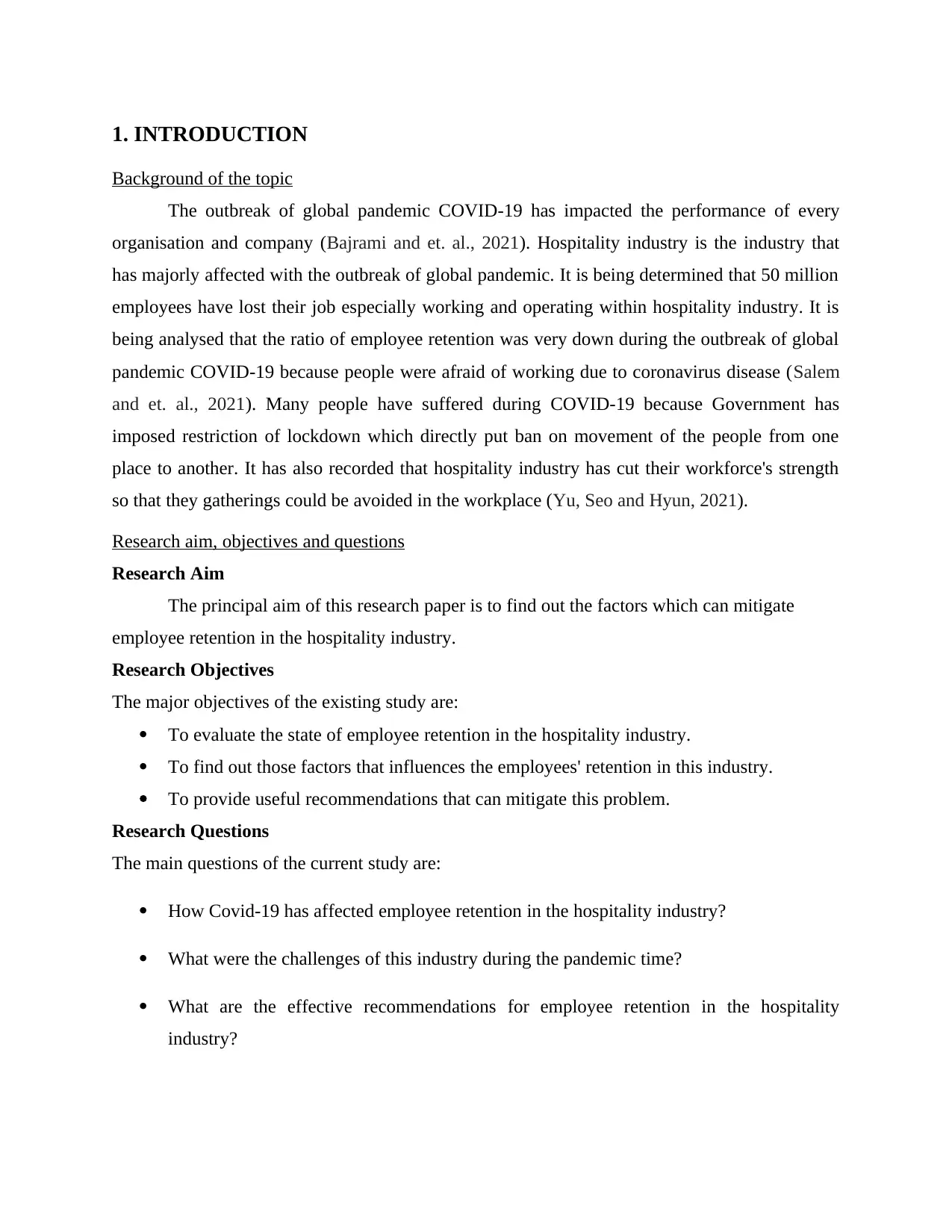
1. INTRODUCTION
Background of the topic
The outbreak of global pandemic COVID-19 has impacted the performance of every
organisation and company (Bajrami and et. al., 2021). Hospitality industry is the industry that
has majorly affected with the outbreak of global pandemic. It is being determined that 50 million
employees have lost their job especially working and operating within hospitality industry. It is
being analysed that the ratio of employee retention was very down during the outbreak of global
pandemic COVID-19 because people were afraid of working due to coronavirus disease (Salem
and et. al., 2021). Many people have suffered during COVID-19 because Government has
imposed restriction of lockdown which directly put ban on movement of the people from one
place to another. It has also recorded that hospitality industry has cut their workforce's strength
so that they gatherings could be avoided in the workplace (Yu, Seo and Hyun, 2021).
Research aim, objectives and questions
Research Aim
The principal aim of this research paper is to find out the factors which can mitigate
employee retention in the hospitality industry.
Research Objectives
The major objectives of the existing study are:
To evaluate the state of employee retention in the hospitality industry.
To find out those factors that influences the employees' retention in this industry.
To provide useful recommendations that can mitigate this problem.
Research Questions
The main questions of the current study are:
How Covid-19 has affected employee retention in the hospitality industry?
What were the challenges of this industry during the pandemic time?
What are the effective recommendations for employee retention in the hospitality
industry?
Background of the topic
The outbreak of global pandemic COVID-19 has impacted the performance of every
organisation and company (Bajrami and et. al., 2021). Hospitality industry is the industry that
has majorly affected with the outbreak of global pandemic. It is being determined that 50 million
employees have lost their job especially working and operating within hospitality industry. It is
being analysed that the ratio of employee retention was very down during the outbreak of global
pandemic COVID-19 because people were afraid of working due to coronavirus disease (Salem
and et. al., 2021). Many people have suffered during COVID-19 because Government has
imposed restriction of lockdown which directly put ban on movement of the people from one
place to another. It has also recorded that hospitality industry has cut their workforce's strength
so that they gatherings could be avoided in the workplace (Yu, Seo and Hyun, 2021).
Research aim, objectives and questions
Research Aim
The principal aim of this research paper is to find out the factors which can mitigate
employee retention in the hospitality industry.
Research Objectives
The major objectives of the existing study are:
To evaluate the state of employee retention in the hospitality industry.
To find out those factors that influences the employees' retention in this industry.
To provide useful recommendations that can mitigate this problem.
Research Questions
The main questions of the current study are:
How Covid-19 has affected employee retention in the hospitality industry?
What were the challenges of this industry during the pandemic time?
What are the effective recommendations for employee retention in the hospitality
industry?
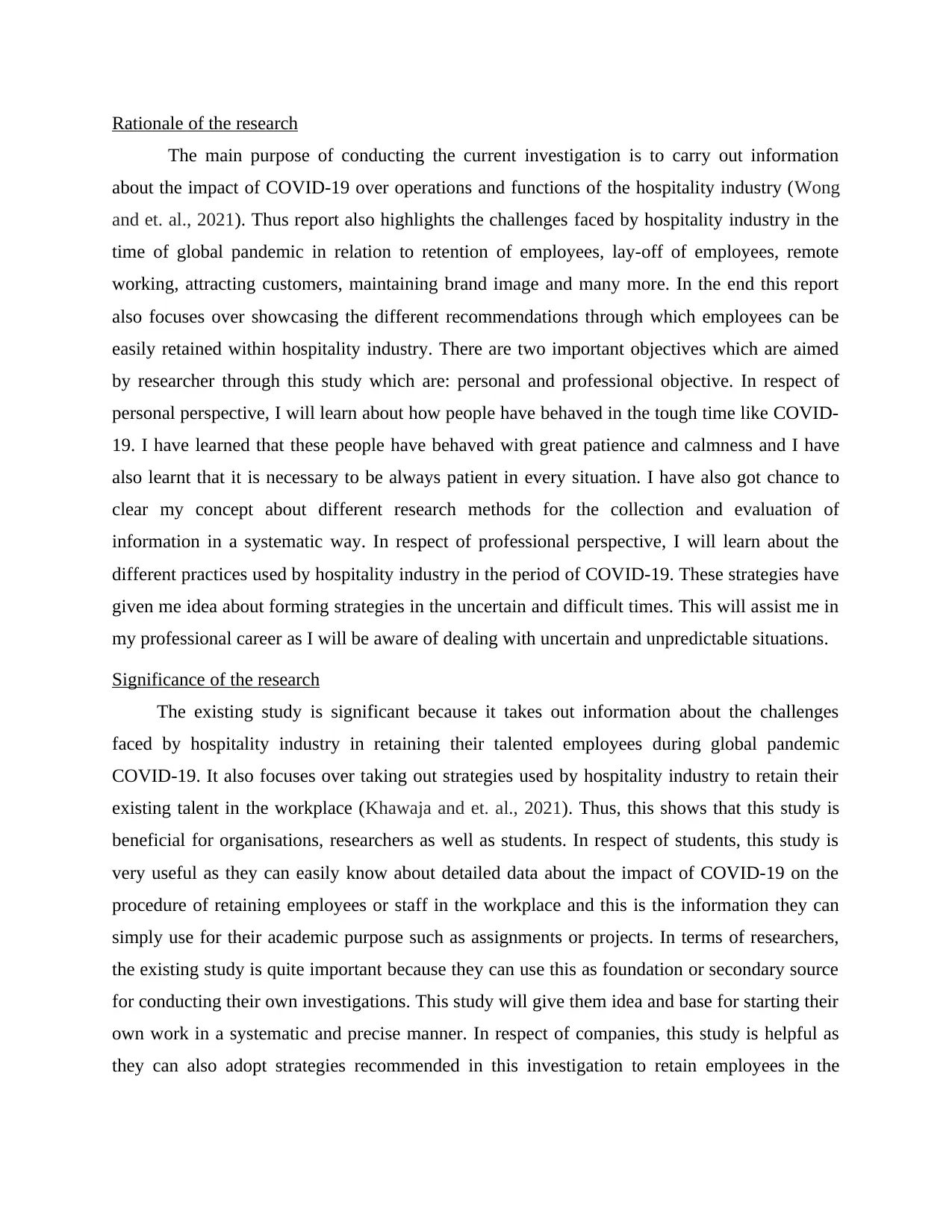
Rationale of the research
The main purpose of conducting the current investigation is to carry out information
about the impact of COVID-19 over operations and functions of the hospitality industry (Wong
and et. al., 2021). Thus report also highlights the challenges faced by hospitality industry in the
time of global pandemic in relation to retention of employees, lay-off of employees, remote
working, attracting customers, maintaining brand image and many more. In the end this report
also focuses over showcasing the different recommendations through which employees can be
easily retained within hospitality industry. There are two important objectives which are aimed
by researcher through this study which are: personal and professional objective. In respect of
personal perspective, I will learn about how people have behaved in the tough time like COVID-
19. I have learned that these people have behaved with great patience and calmness and I have
also learnt that it is necessary to be always patient in every situation. I have also got chance to
clear my concept about different research methods for the collection and evaluation of
information in a systematic way. In respect of professional perspective, I will learn about the
different practices used by hospitality industry in the period of COVID-19. These strategies have
given me idea about forming strategies in the uncertain and difficult times. This will assist me in
my professional career as I will be aware of dealing with uncertain and unpredictable situations.
Significance of the research
The existing study is significant because it takes out information about the challenges
faced by hospitality industry in retaining their talented employees during global pandemic
COVID-19. It also focuses over taking out strategies used by hospitality industry to retain their
existing talent in the workplace (Khawaja and et. al., 2021). Thus, this shows that this study is
beneficial for organisations, researchers as well as students. In respect of students, this study is
very useful as they can easily know about detailed data about the impact of COVID-19 on the
procedure of retaining employees or staff in the workplace and this is the information they can
simply use for their academic purpose such as assignments or projects. In terms of researchers,
the existing study is quite important because they can use this as foundation or secondary source
for conducting their own investigations. This study will give them idea and base for starting their
own work in a systematic and precise manner. In respect of companies, this study is helpful as
they can also adopt strategies recommended in this investigation to retain employees in the
The main purpose of conducting the current investigation is to carry out information
about the impact of COVID-19 over operations and functions of the hospitality industry (Wong
and et. al., 2021). Thus report also highlights the challenges faced by hospitality industry in the
time of global pandemic in relation to retention of employees, lay-off of employees, remote
working, attracting customers, maintaining brand image and many more. In the end this report
also focuses over showcasing the different recommendations through which employees can be
easily retained within hospitality industry. There are two important objectives which are aimed
by researcher through this study which are: personal and professional objective. In respect of
personal perspective, I will learn about how people have behaved in the tough time like COVID-
19. I have learned that these people have behaved with great patience and calmness and I have
also learnt that it is necessary to be always patient in every situation. I have also got chance to
clear my concept about different research methods for the collection and evaluation of
information in a systematic way. In respect of professional perspective, I will learn about the
different practices used by hospitality industry in the period of COVID-19. These strategies have
given me idea about forming strategies in the uncertain and difficult times. This will assist me in
my professional career as I will be aware of dealing with uncertain and unpredictable situations.
Significance of the research
The existing study is significant because it takes out information about the challenges
faced by hospitality industry in retaining their talented employees during global pandemic
COVID-19. It also focuses over taking out strategies used by hospitality industry to retain their
existing talent in the workplace (Khawaja and et. al., 2021). Thus, this shows that this study is
beneficial for organisations, researchers as well as students. In respect of students, this study is
very useful as they can easily know about detailed data about the impact of COVID-19 on the
procedure of retaining employees or staff in the workplace and this is the information they can
simply use for their academic purpose such as assignments or projects. In terms of researchers,
the existing study is quite important because they can use this as foundation or secondary source
for conducting their own investigations. This study will give them idea and base for starting their
own work in a systematic and precise manner. In respect of companies, this study is helpful as
they can also adopt strategies recommended in this investigation to retain employees in the
⊘ This is a preview!⊘
Do you want full access?
Subscribe today to unlock all pages.

Trusted by 1+ million students worldwide
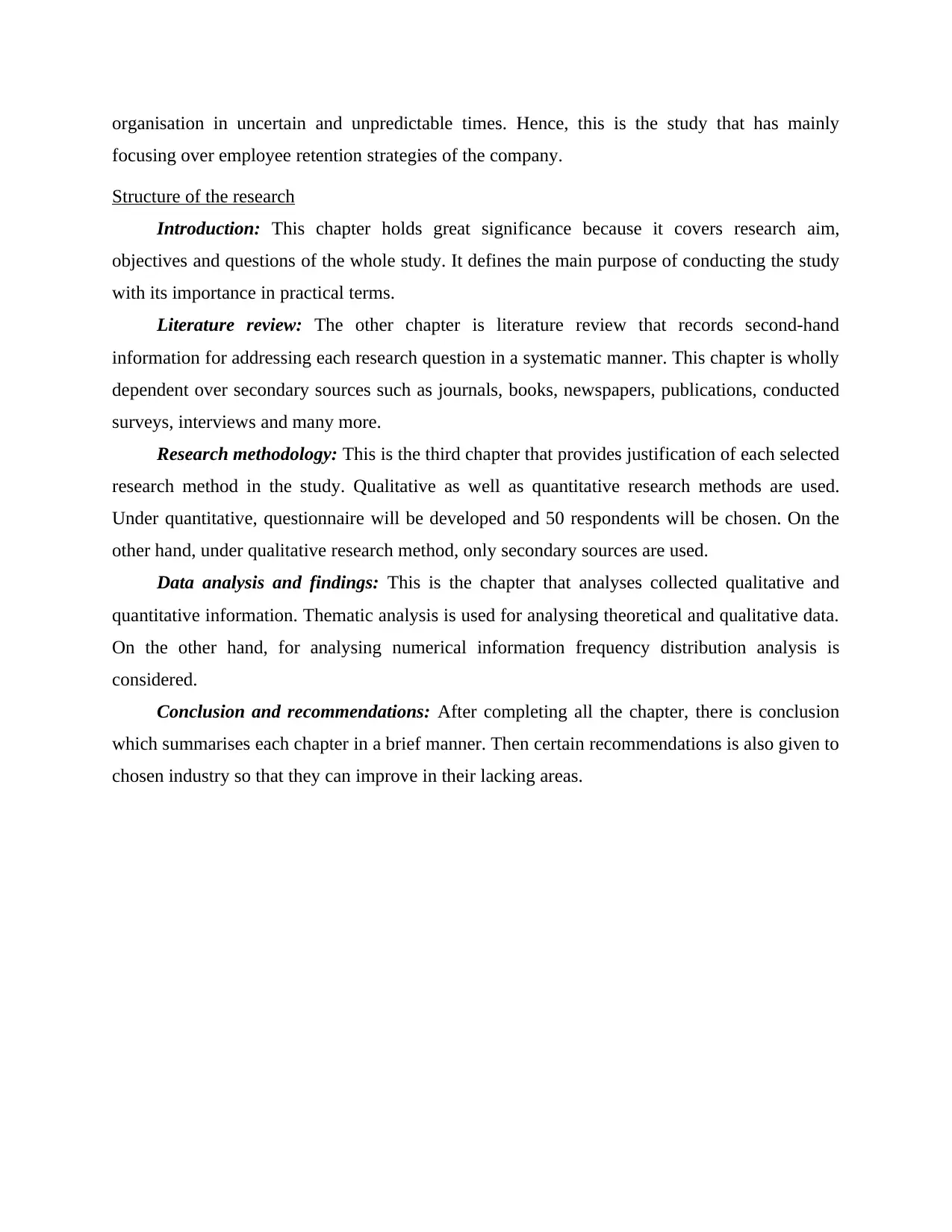
organisation in uncertain and unpredictable times. Hence, this is the study that has mainly
focusing over employee retention strategies of the company.
Structure of the research
Introduction: This chapter holds great significance because it covers research aim,
objectives and questions of the whole study. It defines the main purpose of conducting the study
with its importance in practical terms.
Literature review: The other chapter is literature review that records second-hand
information for addressing each research question in a systematic manner. This chapter is wholly
dependent over secondary sources such as journals, books, newspapers, publications, conducted
surveys, interviews and many more.
Research methodology: This is the third chapter that provides justification of each selected
research method in the study. Qualitative as well as quantitative research methods are used.
Under quantitative, questionnaire will be developed and 50 respondents will be chosen. On the
other hand, under qualitative research method, only secondary sources are used.
Data analysis and findings: This is the chapter that analyses collected qualitative and
quantitative information. Thematic analysis is used for analysing theoretical and qualitative data.
On the other hand, for analysing numerical information frequency distribution analysis is
considered.
Conclusion and recommendations: After completing all the chapter, there is conclusion
which summarises each chapter in a brief manner. Then certain recommendations is also given to
chosen industry so that they can improve in their lacking areas.
focusing over employee retention strategies of the company.
Structure of the research
Introduction: This chapter holds great significance because it covers research aim,
objectives and questions of the whole study. It defines the main purpose of conducting the study
with its importance in practical terms.
Literature review: The other chapter is literature review that records second-hand
information for addressing each research question in a systematic manner. This chapter is wholly
dependent over secondary sources such as journals, books, newspapers, publications, conducted
surveys, interviews and many more.
Research methodology: This is the third chapter that provides justification of each selected
research method in the study. Qualitative as well as quantitative research methods are used.
Under quantitative, questionnaire will be developed and 50 respondents will be chosen. On the
other hand, under qualitative research method, only secondary sources are used.
Data analysis and findings: This is the chapter that analyses collected qualitative and
quantitative information. Thematic analysis is used for analysing theoretical and qualitative data.
On the other hand, for analysing numerical information frequency distribution analysis is
considered.
Conclusion and recommendations: After completing all the chapter, there is conclusion
which summarises each chapter in a brief manner. Then certain recommendations is also given to
chosen industry so that they can improve in their lacking areas.
Paraphrase This Document
Need a fresh take? Get an instant paraphrase of this document with our AI Paraphraser
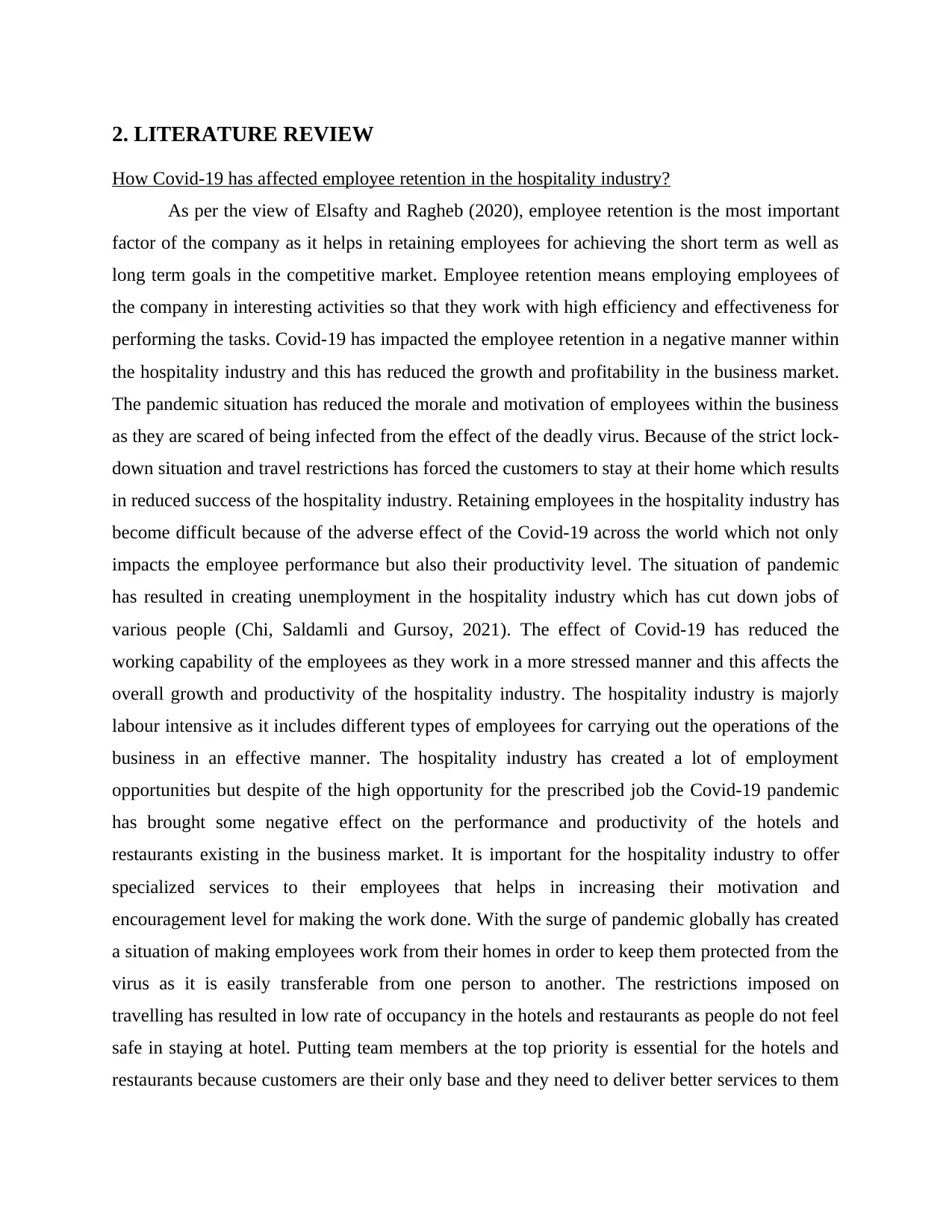
2. LITERATURE REVIEW
How Covid-19 has affected employee retention in the hospitality industry?
As per the view of Elsafty and Ragheb (2020), employee retention is the most important
factor of the company as it helps in retaining employees for achieving the short term as well as
long term goals in the competitive market. Employee retention means employing employees of
the company in interesting activities so that they work with high efficiency and effectiveness for
performing the tasks. Covid-19 has impacted the employee retention in a negative manner within
the hospitality industry and this has reduced the growth and profitability in the business market.
The pandemic situation has reduced the morale and motivation of employees within the business
as they are scared of being infected from the effect of the deadly virus. Because of the strict lock-
down situation and travel restrictions has forced the customers to stay at their home which results
in reduced success of the hospitality industry. Retaining employees in the hospitality industry has
become difficult because of the adverse effect of the Covid-19 across the world which not only
impacts the employee performance but also their productivity level. The situation of pandemic
has resulted in creating unemployment in the hospitality industry which has cut down jobs of
various people (Chi, Saldamli and Gursoy, 2021). The effect of Covid-19 has reduced the
working capability of the employees as they work in a more stressed manner and this affects the
overall growth and productivity of the hospitality industry. The hospitality industry is majorly
labour intensive as it includes different types of employees for carrying out the operations of the
business in an effective manner. The hospitality industry has created a lot of employment
opportunities but despite of the high opportunity for the prescribed job the Covid-19 pandemic
has brought some negative effect on the performance and productivity of the hotels and
restaurants existing in the business market. It is important for the hospitality industry to offer
specialized services to their employees that helps in increasing their motivation and
encouragement level for making the work done. With the surge of pandemic globally has created
a situation of making employees work from their homes in order to keep them protected from the
virus as it is easily transferable from one person to another. The restrictions imposed on
travelling has resulted in low rate of occupancy in the hotels and restaurants as people do not feel
safe in staying at hotel. Putting team members at the top priority is essential for the hotels and
restaurants because customers are their only base and they need to deliver better services to them
How Covid-19 has affected employee retention in the hospitality industry?
As per the view of Elsafty and Ragheb (2020), employee retention is the most important
factor of the company as it helps in retaining employees for achieving the short term as well as
long term goals in the competitive market. Employee retention means employing employees of
the company in interesting activities so that they work with high efficiency and effectiveness for
performing the tasks. Covid-19 has impacted the employee retention in a negative manner within
the hospitality industry and this has reduced the growth and profitability in the business market.
The pandemic situation has reduced the morale and motivation of employees within the business
as they are scared of being infected from the effect of the deadly virus. Because of the strict lock-
down situation and travel restrictions has forced the customers to stay at their home which results
in reduced success of the hospitality industry. Retaining employees in the hospitality industry has
become difficult because of the adverse effect of the Covid-19 across the world which not only
impacts the employee performance but also their productivity level. The situation of pandemic
has resulted in creating unemployment in the hospitality industry which has cut down jobs of
various people (Chi, Saldamli and Gursoy, 2021). The effect of Covid-19 has reduced the
working capability of the employees as they work in a more stressed manner and this affects the
overall growth and productivity of the hospitality industry. The hospitality industry is majorly
labour intensive as it includes different types of employees for carrying out the operations of the
business in an effective manner. The hospitality industry has created a lot of employment
opportunities but despite of the high opportunity for the prescribed job the Covid-19 pandemic
has brought some negative effect on the performance and productivity of the hotels and
restaurants existing in the business market. It is important for the hospitality industry to offer
specialized services to their employees that helps in increasing their motivation and
encouragement level for making the work done. With the surge of pandemic globally has created
a situation of making employees work from their homes in order to keep them protected from the
virus as it is easily transferable from one person to another. The restrictions imposed on
travelling has resulted in low rate of occupancy in the hotels and restaurants as people do not feel
safe in staying at hotel. Putting team members at the top priority is essential for the hotels and
restaurants because customers are their only base and they need to deliver better services to them
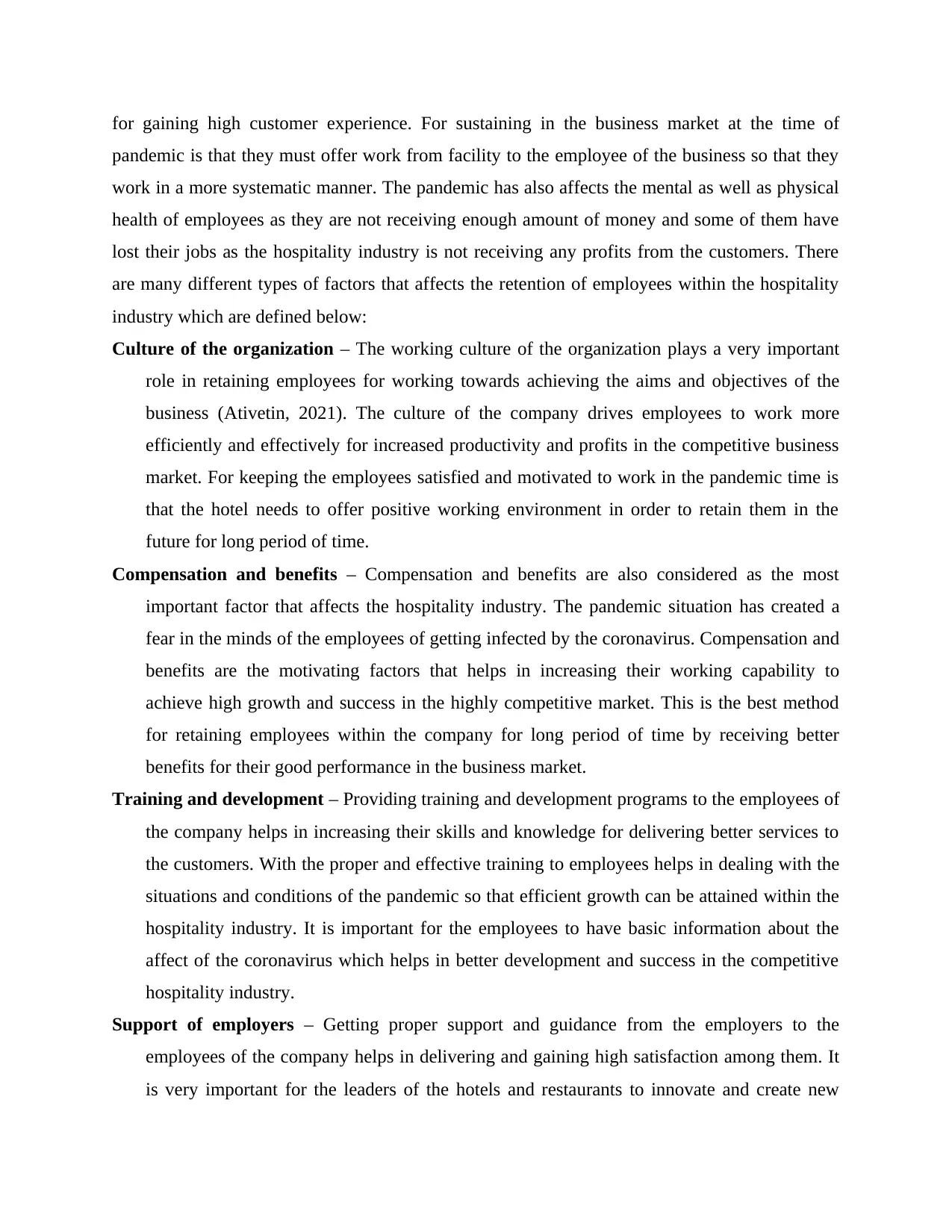
for gaining high customer experience. For sustaining in the business market at the time of
pandemic is that they must offer work from facility to the employee of the business so that they
work in a more systematic manner. The pandemic has also affects the mental as well as physical
health of employees as they are not receiving enough amount of money and some of them have
lost their jobs as the hospitality industry is not receiving any profits from the customers. There
are many different types of factors that affects the retention of employees within the hospitality
industry which are defined below:
Culture of the organization – The working culture of the organization plays a very important
role in retaining employees for working towards achieving the aims and objectives of the
business (Ativetin, 2021). The culture of the company drives employees to work more
efficiently and effectively for increased productivity and profits in the competitive business
market. For keeping the employees satisfied and motivated to work in the pandemic time is
that the hotel needs to offer positive working environment in order to retain them in the
future for long period of time.
Compensation and benefits – Compensation and benefits are also considered as the most
important factor that affects the hospitality industry. The pandemic situation has created a
fear in the minds of the employees of getting infected by the coronavirus. Compensation and
benefits are the motivating factors that helps in increasing their working capability to
achieve high growth and success in the highly competitive market. This is the best method
for retaining employees within the company for long period of time by receiving better
benefits for their good performance in the business market.
Training and development – Providing training and development programs to the employees of
the company helps in increasing their skills and knowledge for delivering better services to
the customers. With the proper and effective training to employees helps in dealing with the
situations and conditions of the pandemic so that efficient growth can be attained within the
hospitality industry. It is important for the employees to have basic information about the
affect of the coronavirus which helps in better development and success in the competitive
hospitality industry.
Support of employers – Getting proper support and guidance from the employers to the
employees of the company helps in delivering and gaining high satisfaction among them. It
is very important for the leaders of the hotels and restaurants to innovate and create new
pandemic is that they must offer work from facility to the employee of the business so that they
work in a more systematic manner. The pandemic has also affects the mental as well as physical
health of employees as they are not receiving enough amount of money and some of them have
lost their jobs as the hospitality industry is not receiving any profits from the customers. There
are many different types of factors that affects the retention of employees within the hospitality
industry which are defined below:
Culture of the organization – The working culture of the organization plays a very important
role in retaining employees for working towards achieving the aims and objectives of the
business (Ativetin, 2021). The culture of the company drives employees to work more
efficiently and effectively for increased productivity and profits in the competitive business
market. For keeping the employees satisfied and motivated to work in the pandemic time is
that the hotel needs to offer positive working environment in order to retain them in the
future for long period of time.
Compensation and benefits – Compensation and benefits are also considered as the most
important factor that affects the hospitality industry. The pandemic situation has created a
fear in the minds of the employees of getting infected by the coronavirus. Compensation and
benefits are the motivating factors that helps in increasing their working capability to
achieve high growth and success in the highly competitive market. This is the best method
for retaining employees within the company for long period of time by receiving better
benefits for their good performance in the business market.
Training and development – Providing training and development programs to the employees of
the company helps in increasing their skills and knowledge for delivering better services to
the customers. With the proper and effective training to employees helps in dealing with the
situations and conditions of the pandemic so that efficient growth can be attained within the
hospitality industry. It is important for the employees to have basic information about the
affect of the coronavirus which helps in better development and success in the competitive
hospitality industry.
Support of employers – Getting proper support and guidance from the employers to the
employees of the company helps in delivering and gaining high satisfaction among them. It
is very important for the leaders of the hotels and restaurants to innovate and create new
⊘ This is a preview!⊘
Do you want full access?
Subscribe today to unlock all pages.

Trusted by 1+ million students worldwide
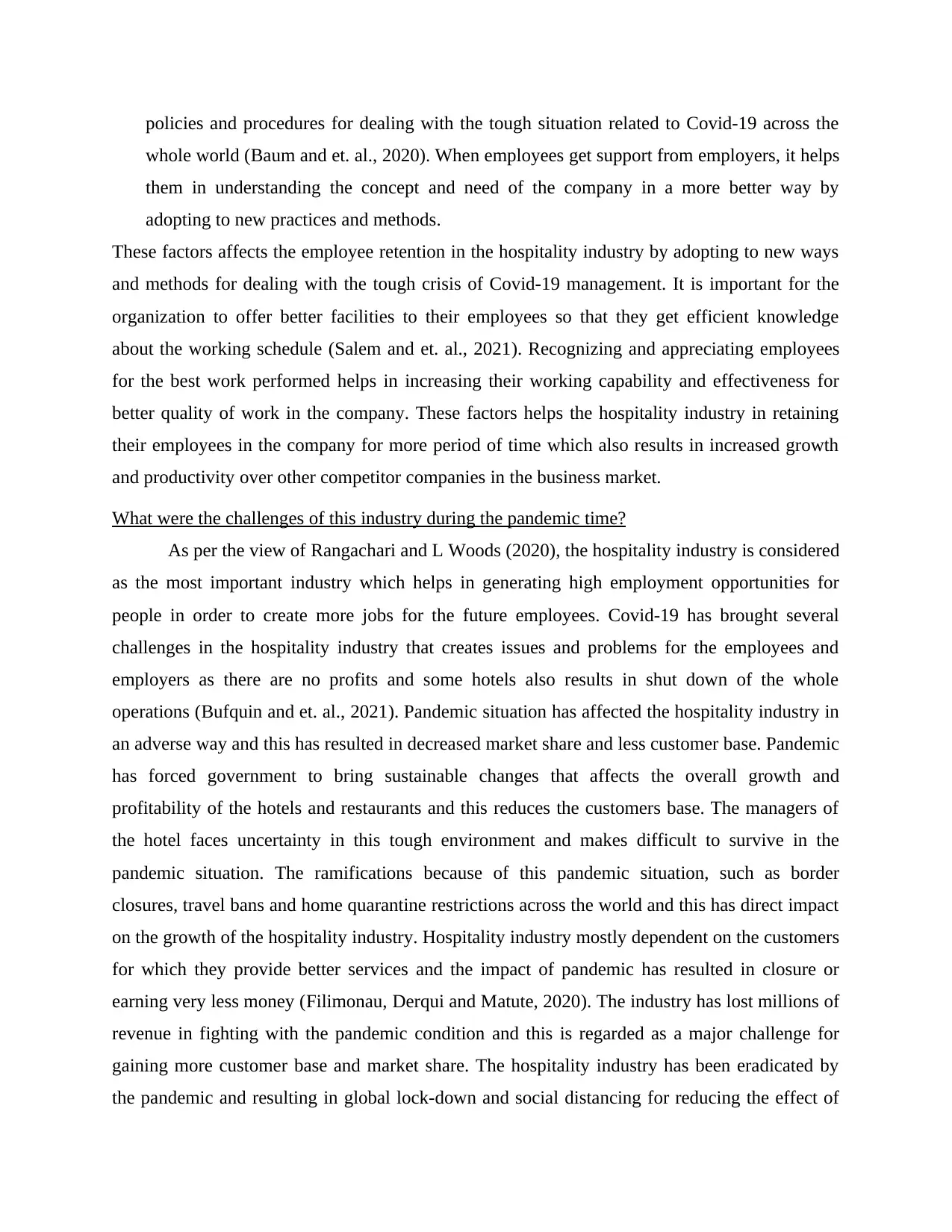
policies and procedures for dealing with the tough situation related to Covid-19 across the
whole world (Baum and et. al., 2020). When employees get support from employers, it helps
them in understanding the concept and need of the company in a more better way by
adopting to new practices and methods.
These factors affects the employee retention in the hospitality industry by adopting to new ways
and methods for dealing with the tough crisis of Covid-19 management. It is important for the
organization to offer better facilities to their employees so that they get efficient knowledge
about the working schedule (Salem and et. al., 2021). Recognizing and appreciating employees
for the best work performed helps in increasing their working capability and effectiveness for
better quality of work in the company. These factors helps the hospitality industry in retaining
their employees in the company for more period of time which also results in increased growth
and productivity over other competitor companies in the business market.
What were the challenges of this industry during the pandemic time?
As per the view of Rangachari and L Woods (2020), the hospitality industry is considered
as the most important industry which helps in generating high employment opportunities for
people in order to create more jobs for the future employees. Covid-19 has brought several
challenges in the hospitality industry that creates issues and problems for the employees and
employers as there are no profits and some hotels also results in shut down of the whole
operations (Bufquin and et. al., 2021). Pandemic situation has affected the hospitality industry in
an adverse way and this has resulted in decreased market share and less customer base. Pandemic
has forced government to bring sustainable changes that affects the overall growth and
profitability of the hotels and restaurants and this reduces the customers base. The managers of
the hotel faces uncertainty in this tough environment and makes difficult to survive in the
pandemic situation. The ramifications because of this pandemic situation, such as border
closures, travel bans and home quarantine restrictions across the world and this has direct impact
on the growth of the hospitality industry. Hospitality industry mostly dependent on the customers
for which they provide better services and the impact of pandemic has resulted in closure or
earning very less money (Filimonau, Derqui and Matute, 2020). The industry has lost millions of
revenue in fighting with the pandemic condition and this is regarded as a major challenge for
gaining more customer base and market share. The hospitality industry has been eradicated by
the pandemic and resulting in global lock-down and social distancing for reducing the effect of
whole world (Baum and et. al., 2020). When employees get support from employers, it helps
them in understanding the concept and need of the company in a more better way by
adopting to new practices and methods.
These factors affects the employee retention in the hospitality industry by adopting to new ways
and methods for dealing with the tough crisis of Covid-19 management. It is important for the
organization to offer better facilities to their employees so that they get efficient knowledge
about the working schedule (Salem and et. al., 2021). Recognizing and appreciating employees
for the best work performed helps in increasing their working capability and effectiveness for
better quality of work in the company. These factors helps the hospitality industry in retaining
their employees in the company for more period of time which also results in increased growth
and productivity over other competitor companies in the business market.
What were the challenges of this industry during the pandemic time?
As per the view of Rangachari and L Woods (2020), the hospitality industry is considered
as the most important industry which helps in generating high employment opportunities for
people in order to create more jobs for the future employees. Covid-19 has brought several
challenges in the hospitality industry that creates issues and problems for the employees and
employers as there are no profits and some hotels also results in shut down of the whole
operations (Bufquin and et. al., 2021). Pandemic situation has affected the hospitality industry in
an adverse way and this has resulted in decreased market share and less customer base. Pandemic
has forced government to bring sustainable changes that affects the overall growth and
profitability of the hotels and restaurants and this reduces the customers base. The managers of
the hotel faces uncertainty in this tough environment and makes difficult to survive in the
pandemic situation. The ramifications because of this pandemic situation, such as border
closures, travel bans and home quarantine restrictions across the world and this has direct impact
on the growth of the hospitality industry. Hospitality industry mostly dependent on the customers
for which they provide better services and the impact of pandemic has resulted in closure or
earning very less money (Filimonau, Derqui and Matute, 2020). The industry has lost millions of
revenue in fighting with the pandemic condition and this is regarded as a major challenge for
gaining more customer base and market share. The hospitality industry has been eradicated by
the pandemic and resulting in global lock-down and social distancing for reducing the effect of
Paraphrase This Document
Need a fresh take? Get an instant paraphrase of this document with our AI Paraphraser
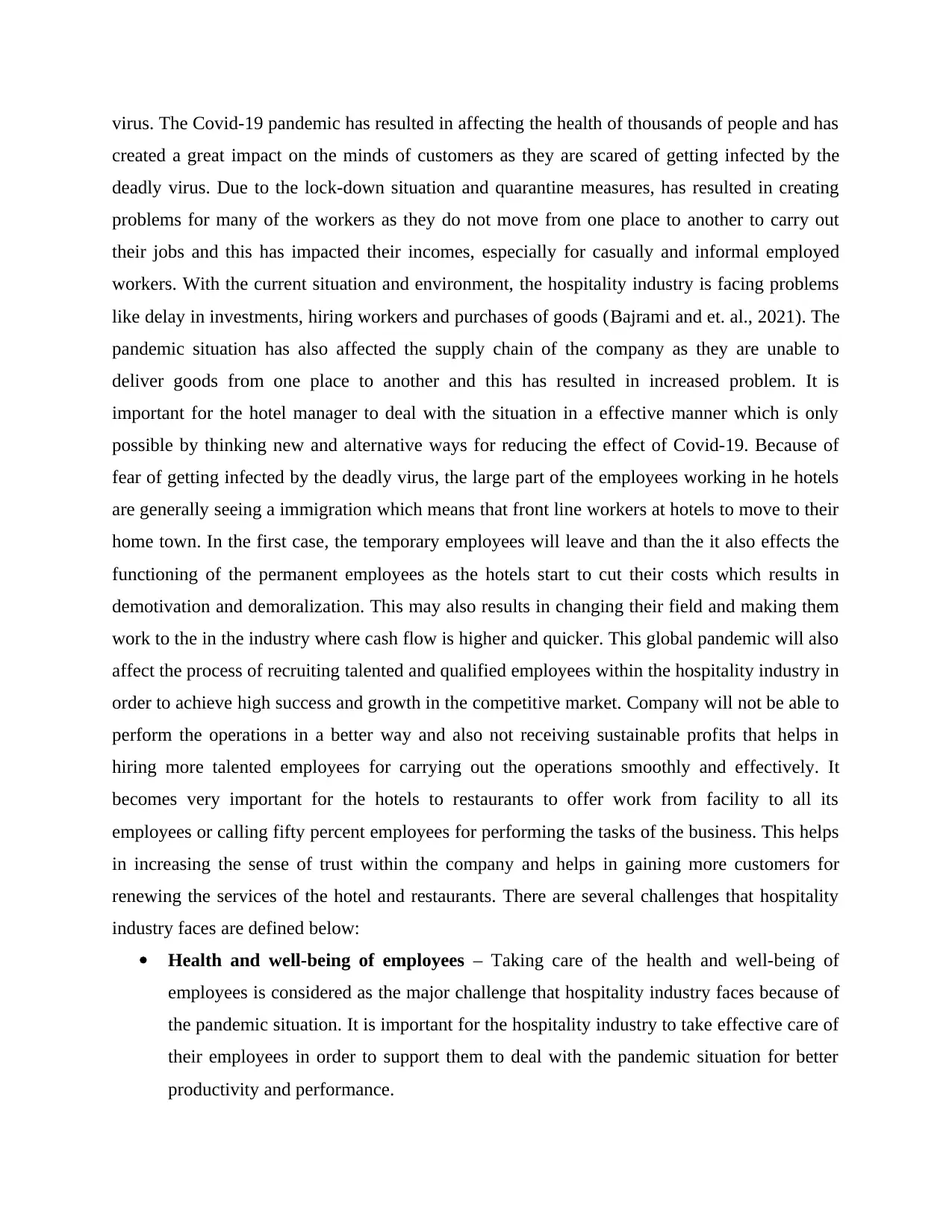
virus. The Covid-19 pandemic has resulted in affecting the health of thousands of people and has
created a great impact on the minds of customers as they are scared of getting infected by the
deadly virus. Due to the lock-down situation and quarantine measures, has resulted in creating
problems for many of the workers as they do not move from one place to another to carry out
their jobs and this has impacted their incomes, especially for casually and informal employed
workers. With the current situation and environment, the hospitality industry is facing problems
like delay in investments, hiring workers and purchases of goods (Bajrami and et. al., 2021). The
pandemic situation has also affected the supply chain of the company as they are unable to
deliver goods from one place to another and this has resulted in increased problem. It is
important for the hotel manager to deal with the situation in a effective manner which is only
possible by thinking new and alternative ways for reducing the effect of Covid-19. Because of
fear of getting infected by the deadly virus, the large part of the employees working in he hotels
are generally seeing a immigration which means that front line workers at hotels to move to their
home town. In the first case, the temporary employees will leave and than the it also effects the
functioning of the permanent employees as the hotels start to cut their costs which results in
demotivation and demoralization. This may also results in changing their field and making them
work to the in the industry where cash flow is higher and quicker. This global pandemic will also
affect the process of recruiting talented and qualified employees within the hospitality industry in
order to achieve high success and growth in the competitive market. Company will not be able to
perform the operations in a better way and also not receiving sustainable profits that helps in
hiring more talented employees for carrying out the operations smoothly and effectively. It
becomes very important for the hotels to restaurants to offer work from facility to all its
employees or calling fifty percent employees for performing the tasks of the business. This helps
in increasing the sense of trust within the company and helps in gaining more customers for
renewing the services of the hotel and restaurants. There are several challenges that hospitality
industry faces are defined below:
Health and well-being of employees – Taking care of the health and well-being of
employees is considered as the major challenge that hospitality industry faces because of
the pandemic situation. It is important for the hospitality industry to take effective care of
their employees in order to support them to deal with the pandemic situation for better
productivity and performance.
created a great impact on the minds of customers as they are scared of getting infected by the
deadly virus. Due to the lock-down situation and quarantine measures, has resulted in creating
problems for many of the workers as they do not move from one place to another to carry out
their jobs and this has impacted their incomes, especially for casually and informal employed
workers. With the current situation and environment, the hospitality industry is facing problems
like delay in investments, hiring workers and purchases of goods (Bajrami and et. al., 2021). The
pandemic situation has also affected the supply chain of the company as they are unable to
deliver goods from one place to another and this has resulted in increased problem. It is
important for the hotel manager to deal with the situation in a effective manner which is only
possible by thinking new and alternative ways for reducing the effect of Covid-19. Because of
fear of getting infected by the deadly virus, the large part of the employees working in he hotels
are generally seeing a immigration which means that front line workers at hotels to move to their
home town. In the first case, the temporary employees will leave and than the it also effects the
functioning of the permanent employees as the hotels start to cut their costs which results in
demotivation and demoralization. This may also results in changing their field and making them
work to the in the industry where cash flow is higher and quicker. This global pandemic will also
affect the process of recruiting talented and qualified employees within the hospitality industry in
order to achieve high success and growth in the competitive market. Company will not be able to
perform the operations in a better way and also not receiving sustainable profits that helps in
hiring more talented employees for carrying out the operations smoothly and effectively. It
becomes very important for the hotels to restaurants to offer work from facility to all its
employees or calling fifty percent employees for performing the tasks of the business. This helps
in increasing the sense of trust within the company and helps in gaining more customers for
renewing the services of the hotel and restaurants. There are several challenges that hospitality
industry faces are defined below:
Health and well-being of employees – Taking care of the health and well-being of
employees is considered as the major challenge that hospitality industry faces because of
the pandemic situation. It is important for the hospitality industry to take effective care of
their employees in order to support them to deal with the pandemic situation for better
productivity and performance.
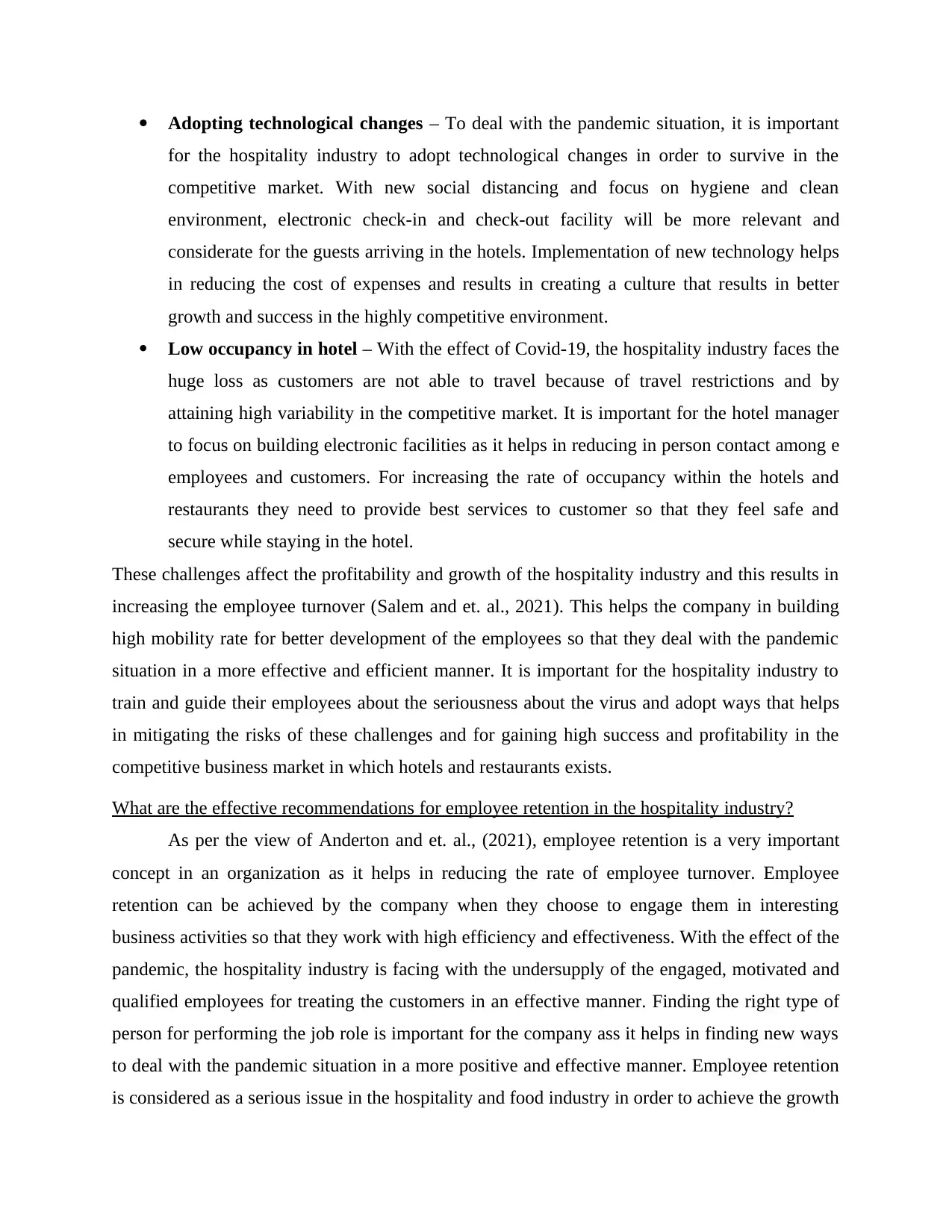
Adopting technological changes – To deal with the pandemic situation, it is important
for the hospitality industry to adopt technological changes in order to survive in the
competitive market. With new social distancing and focus on hygiene and clean
environment, electronic check-in and check-out facility will be more relevant and
considerate for the guests arriving in the hotels. Implementation of new technology helps
in reducing the cost of expenses and results in creating a culture that results in better
growth and success in the highly competitive environment.
Low occupancy in hotel – With the effect of Covid-19, the hospitality industry faces the
huge loss as customers are not able to travel because of travel restrictions and by
attaining high variability in the competitive market. It is important for the hotel manager
to focus on building electronic facilities as it helps in reducing in person contact among e
employees and customers. For increasing the rate of occupancy within the hotels and
restaurants they need to provide best services to customer so that they feel safe and
secure while staying in the hotel.
These challenges affect the profitability and growth of the hospitality industry and this results in
increasing the employee turnover (Salem and et. al., 2021). This helps the company in building
high mobility rate for better development of the employees so that they deal with the pandemic
situation in a more effective and efficient manner. It is important for the hospitality industry to
train and guide their employees about the seriousness about the virus and adopt ways that helps
in mitigating the risks of these challenges and for gaining high success and profitability in the
competitive business market in which hotels and restaurants exists.
What are the effective recommendations for employee retention in the hospitality industry?
As per the view of Anderton and et. al., (2021), employee retention is a very important
concept in an organization as it helps in reducing the rate of employee turnover. Employee
retention can be achieved by the company when they choose to engage them in interesting
business activities so that they work with high efficiency and effectiveness. With the effect of the
pandemic, the hospitality industry is facing with the undersupply of the engaged, motivated and
qualified employees for treating the customers in an effective manner. Finding the right type of
person for performing the job role is important for the company ass it helps in finding new ways
to deal with the pandemic situation in a more positive and effective manner. Employee retention
is considered as a serious issue in the hospitality and food industry in order to achieve the growth
for the hospitality industry to adopt technological changes in order to survive in the
competitive market. With new social distancing and focus on hygiene and clean
environment, electronic check-in and check-out facility will be more relevant and
considerate for the guests arriving in the hotels. Implementation of new technology helps
in reducing the cost of expenses and results in creating a culture that results in better
growth and success in the highly competitive environment.
Low occupancy in hotel – With the effect of Covid-19, the hospitality industry faces the
huge loss as customers are not able to travel because of travel restrictions and by
attaining high variability in the competitive market. It is important for the hotel manager
to focus on building electronic facilities as it helps in reducing in person contact among e
employees and customers. For increasing the rate of occupancy within the hotels and
restaurants they need to provide best services to customer so that they feel safe and
secure while staying in the hotel.
These challenges affect the profitability and growth of the hospitality industry and this results in
increasing the employee turnover (Salem and et. al., 2021). This helps the company in building
high mobility rate for better development of the employees so that they deal with the pandemic
situation in a more effective and efficient manner. It is important for the hospitality industry to
train and guide their employees about the seriousness about the virus and adopt ways that helps
in mitigating the risks of these challenges and for gaining high success and profitability in the
competitive business market in which hotels and restaurants exists.
What are the effective recommendations for employee retention in the hospitality industry?
As per the view of Anderton and et. al., (2021), employee retention is a very important
concept in an organization as it helps in reducing the rate of employee turnover. Employee
retention can be achieved by the company when they choose to engage them in interesting
business activities so that they work with high efficiency and effectiveness. With the effect of the
pandemic, the hospitality industry is facing with the undersupply of the engaged, motivated and
qualified employees for treating the customers in an effective manner. Finding the right type of
person for performing the job role is important for the company ass it helps in finding new ways
to deal with the pandemic situation in a more positive and effective manner. Employee retention
is considered as a serious issue in the hospitality and food industry in order to achieve the growth
⊘ This is a preview!⊘
Do you want full access?
Subscribe today to unlock all pages.

Trusted by 1+ million students worldwide
1 out of 34
Related Documents
Your All-in-One AI-Powered Toolkit for Academic Success.
+13062052269
info@desklib.com
Available 24*7 on WhatsApp / Email
![[object Object]](/_next/static/media/star-bottom.7253800d.svg)
Unlock your academic potential
Copyright © 2020–2026 A2Z Services. All Rights Reserved. Developed and managed by ZUCOL.



